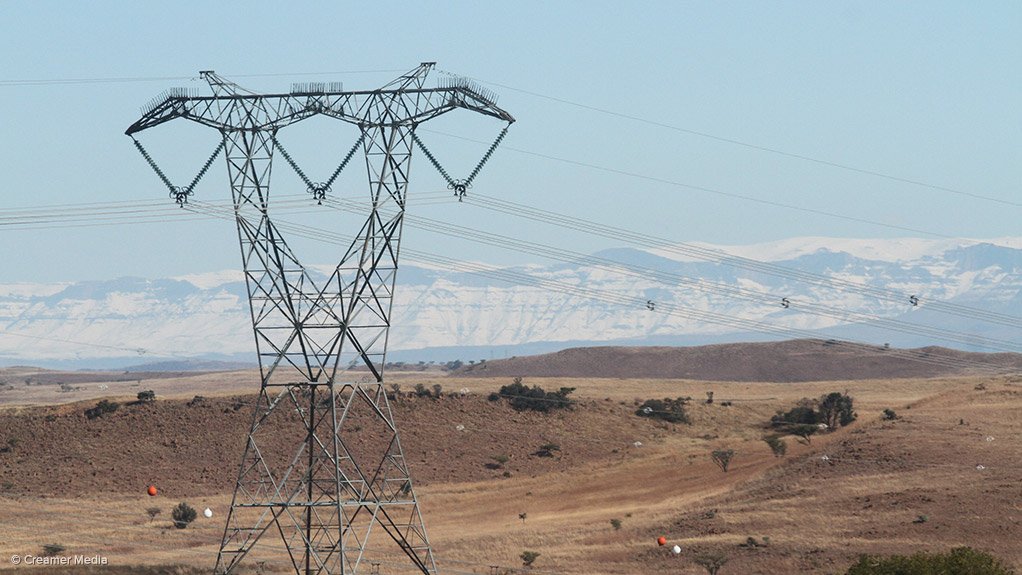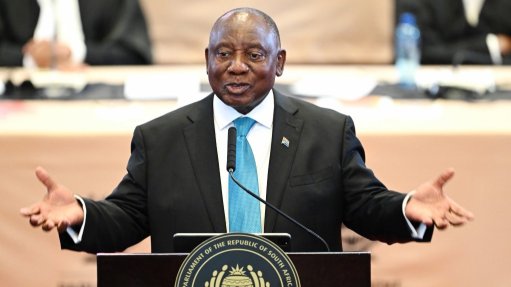Sanedi says govt may use Expropriation Act to secure land for transmission line rollout
South African National Energy Development Institute (Sanedi) energy secretariat head Professor Sampson Mamphweli says the government intends to leverage the Expropriation Act to acquire land for servitudes as part of its transmission network expansion programme.
“It is known that much of the land under negotiation is underproductive and some farmers are no longer using it. However, in some cases, the government is pressured during negotiations and ends up paying significantly more for the servitude than the land is actually worth,” he noted at the inaugural Energy Indaba, hosted by the University of South Africa’s (Unisa's) College of Human Sciences (CHS), in Pretoria, on September 22.
He commented on the government’s plan for ensuring that citizens were not effectively “held hostage” by inflated payments for transmission line servitudes.
“We passed the Expropriation Act, and part of the reason it was passed was specifically to deal with servitudes. The government can approach me regarding my land, which is mine, and try to negotiate with me. If I become unreasonable, they can use that Act to expropriate the land, and then build the transmission lines.
“That is basically how it should work now that we have the Expropriation Act. This was one way for the government to act in the interest of the people, rather than for the individual,” he said.
The 2024 Expropriation Act distinguishes between "public purpose" and "public interest" as grounds for expropriation without compensation. "Public purpose" pertains to specific public uses, such as the development of infrastructure like energy transmission lines, while "public interest" encompasses broader objectives, including land reform and equitable access to resources.
This legislative framework comes as the National Transmission Company of South Africa (NTCSA) plans to expand the transmission network by about 14 000 km over the next decade. The NTCSA has previously indicated that it may resort to land expropriation to secure routes for building transmission infrastructure, with Electricity and Energy Minister Kgosientsho Ramokgopa telling Parliament in June that the NTCSA had exhausted all other avenues.
DECARBONISED ENERGY
Mamphweli also addressed the broader challenges that lie ahead in decarbonising South Africa’s power sector, highlighting the draft Integrated Resource Plan (IRP) 2024, currently before Cabinet, which sets ambitious targets for renewable-energy deployment alongside the decommissioning of coal-fired power stations.
He emphasised the importance of the just energy transition (JET) framework to ensure social and economic equity during this period of transformation.
He outlined several systemic challenges. Grid capacity constraints, particularly in provinces with the best renewable-energy resources, necessitate major investment in new transmission lines and substations.
The financial requirements for grid expansion are significant, estimated at more than R400-billion, and private sector participation is considered essential.
He lamented that the pace of community participation and ownership in independent power producer (IPP) projects remained slow, with ongoing issues around the effectiveness of community trusts and the distribution of benefits.
Additional challenges included navigating regulatory and legal complexities in implementing new market structures and unbundling Eskom, balancing short-term energy stability with long-term decarbonisation, and ensuring inclusivity, skills development, and social ownership throughout the energy transition.
Mamphweli also highlighted the growing role of the carbon credits market in supporting South Africa’s JET. One of the key drivers is the EU’s Carbon Border Adjustment Mechanism (CBAM), which imposes tariffs on goods produced with high carbon emissions when entering the EU market.
To remain competitive, Mamphweli said South African producers needed to decarbonise their production processes, and carbon credits could help offset emissions and demonstrate compliance.
He said South Africa was considering strategies such as ring-fencing renewable energy for goods destined for export markets, allowing producers to claim carbon credits and avoid penalties. He noted that these mechanisms could incentivise investment in renewable energy and low-carbon technologies while providing financial returns for projects that reduce emissions.
To fully leverage the carbon credits market, Mamphweli said South Africa was focused on developing robust systems for measuring, reporting and verifying emissions reductions.
He said that encouraging local participation in carbon credit projects would ensure that communities could benefit from the transition, while aligning national policies with international carbon market standards to maximise access and value.
Mamphweli said carbon credits also offered opportunities to attract investment and support the financing of renewable energy and just transition initiatives, enabling compliance with international trade requirements and ensuring equitable distribution of the benefits of decarbonisation.
LEVERAGING PRIVATE SECTOR PARTICIPATION
Mamphweli emphasised that greater community participation and ownership in renewable-energy projects was critical. He outlined several approaches through which the government and private sector could collaborate to strengthen engagement and ensure equitable benefits.
Reforming community benefit structures was a priority, he said, as current models often allocated a percentage of project ownership or revenue to community trusts, but these funds frequently failed to reach intended beneficiaries or remained unused owing to misalignment with local needs.
He said that strengthening oversight and accountability through monitoring by the IPP Office was aimed at ensuring community funds were effectively managed.
Facilitating access for emerging and community-owned IPPs was another key focus, Mamphweli said. He noted that workshops for emerging IPPs had been held to identify and address bottlenecks preventing historically disadvantaged communities and individuals from participating as project owners.
This includes exploring financial instruments and support mechanisms to help new entrants access capital and navigate regulatory requirements.
Private sector partnerships were also encouraged, with development finance institutions and major investors providing technical, financial, and managerial support directly to community groups and emerging IPPs.
Mamphweli said tailoring community development initiatives to align with local stakeholder needs would ensure that investments in training, infrastructure, and social programmes matched actual community priorities.
He emphasised that policy and regulatory support was essential to create enabling frameworks and incentives that prioritised meaningful community participation and ownership in renewable-energy procurement.
Mamphweli said effective collaboration required transparent benefit-sharing mechanisms, targeted financial and technical support, active government oversight, and genuine engagement with communities to ensure renewable-energy projects could deliver lasting and equitable benefits.
The Energy Indaba was held under the theme of 'Advancing an inclusive JET agenda through multi-, inter-, intra and transdisciplinary collaboration'.
The event was conceived as a key contributor to the university’s efforts in advancing its Energy Catalytic Niche Area through teaching, learning, research and engaged scholarship.
“These collaborations will play a vital role in the development of curricula that are purposefully designed to ensure that teaching and learning respond effectively to the pressing needs of our society during this critical transition period.
“Through practical capstone projects, students will participate in industry-aligned research aimed at delivering real-world solutions, thereby equipping graduates to drive meaningful change in areas such as energy accessibility, policy and innovation,” Unisa CHS executive dean Professor Zethu Nkosi said.
Article Enquiry
Email Article
Save Article
Feedback
To advertise email advertising@creamermedia.co.za or click here
Announcements
What's On
Subscribe to improve your user experience...
Option 1 (equivalent of R125 a month):
Receive a weekly copy of Creamer Media's Engineering News & Mining Weekly magazine
(print copy for those in South Africa and e-magazine for those outside of South Africa)
Receive daily email newsletters
Access to full search results
Access archive of magazine back copies
Access to Projects in Progress
Access to ONE Research Report of your choice in PDF format
Option 2 (equivalent of R375 a month):
All benefits from Option 1
PLUS
Access to Creamer Media's Research Channel Africa for ALL Research Reports, in PDF format, on various industrial and mining sectors
including Electricity; Water; Energy Transition; Hydrogen; Roads, Rail and Ports; Coal; Gold; Platinum; Battery Metals; etc.
Already a subscriber?
Forgotten your password?
Receive weekly copy of Creamer Media's Engineering News & Mining Weekly magazine (print copy for those in South Africa and e-magazine for those outside of South Africa)
➕
Recieve daily email newsletters
➕
Access to full search results
➕
Access archive of magazine back copies
➕
Access to Projects in Progress
➕
Access to ONE Research Report of your choice in PDF format
RESEARCH CHANNEL AFRICA
R4500 (equivalent of R375 a month)
SUBSCRIBEAll benefits from Option 1
➕
Access to Creamer Media's Research Channel Africa for ALL Research Reports on various industrial and mining sectors, in PDF format, including on:
Electricity
➕
Water
➕
Energy Transition
➕
Hydrogen
➕
Roads, Rail and Ports
➕
Coal
➕
Gold
➕
Platinum
➕
Battery Metals
➕
etc.
Receive all benefits from Option 1 or Option 2 delivered to numerous people at your company
➕
Multiple User names and Passwords for simultaneous log-ins
➕
Intranet integration access to all in your organisation





















